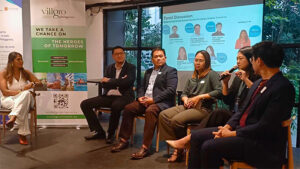Embracing the future of work

The global health crisis due to the COVID-19 pandemic, has indisputably induced far-reaching transformations in various spheres of our lives, including the realm of employment. The abrupt onset of this international health emergency necessitated rapid adaptations by governments, enterprises, and individuals alike, resulting in substantial modifications to prevailing work setups and methodologies. As we chart our course ahead, it becomes imperative to scrutinize the forthcoming contours of employment, particularly in the context of Southeast Asia and the Philippines.
The pandemic acted as a catalyst, hastening trends that were already shaping the future of work, such as telecommuting, digitization, and adaptable work schemes. A study conducted by the McKinsey Global Institute underscored the necessity of remote work and virtual collaboration tools for numerous organizations to sustain their operations. The study approximated that roughly 20% to 25% of the workforce in advanced economies could viably engage in remote work for a significant proportion of their working hours, even beyond the pandemic’s subsidence. This transformation has been propelled by the efficacy demonstrated by remote work during the pandemic and the realization that numerous job functions can be executed effectively without a brick-and-mortar office space.
Within Southeast Asia, where the pandemic expedited digital transformations, companies started embracing technological solutions to facilitate remote work. For instance, Singapore, renowned as a regional hub for finance and technology, bore witness to heightened demand for cloud-based collaboration tools, consequently catalyzing the expansion of the Software-as-a-Service (SaaS) sector. Similarly, Indonesia’s e-commerce and ride-hailing industries gained traction, as individuals turned to online platforms for essential services.
A study conducted by Deloitte emphasized the emergence of hybrid work models as a prevailing trend within the post-pandemic work landscape. These models blend elements of remote and on-site work, providing employees with enhanced flexibility to select when and where they work. This approach aspires to strike a balance between the advantages of remote work — like decreased commuting time and augmented work-life equilibrium — and the merits of in-person cooperation for fostering creativity and collaborative teamwork.
In the Philippines, companies are actively exploring hybrid work models to cater to employees’ inclinations while concurrently ensuring sustained productivity levels. Notably, call centers and business process outsourcing firms, a pivotal sector in the country, are implementing rotating shifts and remote work alternatives to maintain social distancing measures and operational continuity. By offering adaptable arrangements, businesses can entice and retain talent, particularly from the younger demographic, which places considerable emphasis on achieving equilibrium between work and personal life.
IMPACTS ON COMPETENCIES AND WORKFORCE ENHANCEMENTThe overhaul of the work landscape bears implications for enhancing competencies and workforce development. A report by the World Economic Forum underscored the significance of upskilling and reskilling endeavors to bridge the competency gap exacerbated by technological advancements and evolving work requisites. The report postulated that future employment roles would necessitate a fusion of technical acumen and soft skills, including adept problem-solving, discerning critical thinking, and adeptness in emotional intelligence.
Across Southeast Asia, nations like Vietnam are investing in educational and training initiatives to equip the workforce with the skills essential for navigating the digital economy. Notably, the Vietnamese government has introduced initiatives aimed at promoting digital literacy and coding prowess among students, recognizing the imperative of preparing the emerging generation for an environment propelled by technological innovations.
While the future of work augurs opportunities, it also presents challenges and potential disparities. Not all professions lend themselves to remote work, and certain segments of the workforce are more susceptible to the digital divide. A study by the International Labour Organization (ILO) underscored those informal laborers, individuals with limited skill sets, and those entrenched within the gig economy encounter heightened vulnerabilities to job and income loss.
In the Philippines, the pandemic laid bare the predicaments faced by laborers within the informal sector, encompassing street vendors and daily-wage workers. The abrupt imposition of lockdowns disrupted their sustenance, spotlighting the exigency for social safety nets and mechanisms of support to address economic vulnerabilities.
The repercussions of the COVID-19 pandemic have indubitably recalibrated the prospects and paradigms of work, expediting trends such as telecommuting, hybrid models, and digitization. The Southeast Asian terrain, including the Philippines, has been a firsthand observer to these transformations, with industries and administrations alike adapting to new work modalities and tackling attendant challenges. As we navigate forward, it becomes paramount to prioritize competency development, foster inclusivity, and formulate policies that engender a robust and equitable workforce. By harnessing the possibilities occasioned by the evolving work panorama, we can orchestrate a future that espouses adaptability, innovation, and sustainable advancement.
IMPLICATIONS FOR THE FILIPINO WORKFORCEAs the future of work takes shape, the Filipino workforce stands on the precipice of change, navigating the convergence of remote work and AI integration. Remote work isn’t just about convenience; it’s about redefining traditional work structures, emphasizing outcomes over hours spent at a physical office.
The Global Workforce Happiness Index underscores this shift, revealing that Filipino workers value remote work’s flexibility and the ability to strike a better work-life balance. The ability to customize work environments to individual preferences is empowering, potentially boosting job satisfaction and overall well-being.
However, challenges persist. Remote work highlights the digital divide, with limited access to technology hindering some Filipinos from participating fully. Initiatives such as the Department of Information and Communications Technology’s (DICT) Free Wi-Fi for All Program are vital in bridging this gap, ensuring equal access to remote work opportunities.
A GLIMPSE OF TOMORROWIn the Philippines, the future of work isn’t a distant abstraction — it’s unfolding before us. The Makati Central Business District, once a symbol of traditional office life, is evolving as companies adopt hybrid work models. As employees switch between remote and in-person work, spaces are redesigned to encourage collaboration, creativity, and well-being.
The pandemic, combined with AI’s integration, has propelled us into a future where work is redefined. The remote work revolution has shown that productivity isn’t confined to a cubicle; AI is augmenting our capabilities, presenting opportunities for innovation in fields as diverse as healthcare and manufacturing.
As the Filipino workforce navigates the post-pandemic, adaptability emerges as the cornerstone of success. Our journey forward involves embracing technological advancements while maintaining a human-centered approach. Remote work’s triumphs lie in granting us flexibility, and AI’s potential lies in elevating our skills.
The Philippines has historically showcased resilience in the face of adversity. We can harness this spirit to craft a future where work is not a chore but a dynamic collaboration between humans and technology. By prioritizing access, upskilling, and well-being, we can sculpt a future that places us at the forefront of the global workforce evolution.
As we gaze at the horizon of the future of work, the convergence of pandemic-induced transformations and the rise of AI beckons us to embrace change. Let us embark on this journey with optimism, determined to harness these forces to shape a workplace that is not only efficient but also compassionate — a space where innovation thrives, and the Filipino workforce remains at the forefront of progress.
Ron F. Jabal, DBA, APR, is the chairman and CEO of PAGEONE Group (www.pageonegroup.ph) and founder of Advocacy Partners Asia (www.advocacy.ph).




